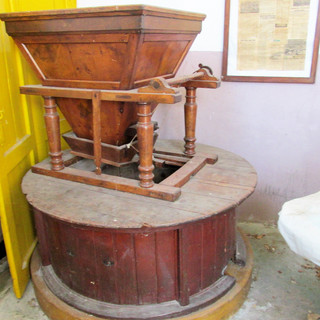Drobnica - the keeper of olive growers' tradition in Preko
- Andrea Seifert
- Nov 18, 2017
- 3 min read
Updated: Feb 19, 2019
In the peaceful little port of Preko, overlooking the islet of Galovac, Mrs. Mladenka Mašina opens the rustic iron door and lets us in the old olive oil factory. Once it was a museum dedicated to the tradition of olive oil making on the island of Ugljan, but today it waits for better times and renovation. Sometimes it may be open and tourists may learn more about the techniques and ways to produce extra-virgin olive oils.

Mrs. Mladenka was kind enough to open the place for us and talked about the tradition and contemporary olive oil making, although she was ready to head for her own olive groves and pick the olives. We came deliberately on Ugljan for the olive picking season. The island is full of locals and their relatives coming from the shore. Two beautiful days for the weekend were the last best days to pick these healthy products. Many will go for drobnica (the local sort that gives thicker oil) and orkula or oblica (which gives more fluent oil). In the village of Poljana, they are proud of puljka, the olive growing in very tall trees, possibly stemming from the Italian province of Puglia. In Sutomišćica, known for its marina, people pick oštrica. Other sorts are also present on Ugljan, mostly leccino, pendolino and other Italian kinds of olives.
Drobnica may be traditionally the most favourite kind of olives on the island. One of the oil refineries was right here in Preko, where a communal company (zadruga) was established in the 19th century. The community was very active between 1905 and the First World War, and even after that. The technique didn't change much from that time, save the technology used. Since Roman times, people used to keep olives in the sea in order to mild its taste. However, this cannot be considered an extra-virgin olive oil as the oil loses all its healthy ingredients. Islanders hardly adjust to new circumstances and new tastes, but mild olive oils are now becoming more popular. Luckily, more and more olive growers bring the freshly picked olives directly to the millers and refine their oil quickly, as it gives the best quality.

Today, there are some 100,000 cultivated olive trees on Ugljan. Mrs. Mladenka knows most of them and their oils. No wonder, as she is educated olive oil taster and judge. She talks about the complexities and nuances of this job, where minor differences that are invisible to us mortals can be a decisive factor whose oil is better. Among different things we learned here is that colur of the oil doesn't determins the quality of the oil, the smell has several categories, and the taste should have the natural spiciness.
In 1905 more than 80 farmers were in the association. It was a platform of mutual benefit and help in any activity involving olives and when the refinery was electrified, it was also used to mill corn from Zadar and its surroundings. More than a century, the Association was the main economic factor in Preko and one of the important factors of economic development and olive growing in the Northern Dalmatia. Already in 1911, it started with the organised tourism, with private accommodation, a restaurant in Zmorac and Hotel Preko. The remnants of tourism activity not so long ago are seen on the walls, where Preko is situated on top destinations in Adriatic, far above many posh places today.
We talk in the production hall, where large boulder-press is exhibited, together with old-fashioned presses and scales, record books and picking materials, all wrapped in a scent of long forgotten times whose essence is seen on the faces of people on black-and-white photographs hanging on the walls. A step into the past is an evidence of the importance of olive. It nourished the islanders, it healed them, it was even a source of light as the oil lamps were filled with olive oil.
There is a new Agricultural Association Drobnica, the successor of famous oil association, with some 270 members. They don't only grow and pick olives, they also restore abandoned olive groves. In fact, there are as many abandoned olive trees as there are cultivated ones. But, as the old proverb says, olive is as a mother – whenever you return to her, she gives the best she can.
PZ Drobnica Magazin 6, 23 273 Preko 00385 (0)91 286 1344
maslina002@gmail.com
Gallery:
































